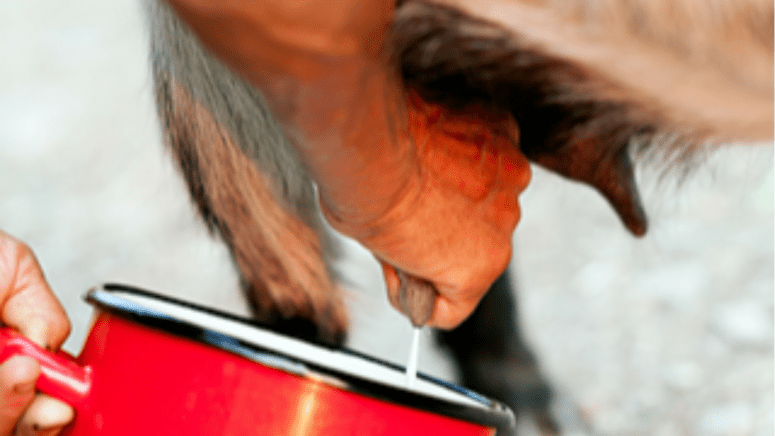Posted by Jennifer Sartell, Professional Homesteader & Blogger, Wed, Nov 15, 2017
Buying goats can be such a fun experience!
Goats are not terribly expensive animals; even award-winning lines are fairly reasonable considering what some purebred dog breeds cost. But still, you want to make sure you are getting a valuable animal for your money.
You also don’t want to be bringing home problems. Unhealthy animals can bring disease to your entire herd and rack up veterinarian bills quickly. Another thing that you have to consider if you are planning on breeding a new goat is that this animal’s genes will become part of your line. You want to perpetuate healthy, desirable animals in your herd.
All of our goat purchases have been from breeders I’ve found online. In these cases, the questions began before I even left the house. Do as much research as you can on the person selling the goat. Often breeders will have a webpage. Visit it, and spend some time reading about their farm. Check their credentials and former sales.
If you have questions, ask the breeder. Give them a call or send an email. Breeders should be somewhat enthusiastic and willing to answer your questions thoroughly. They should also be willing to share photos of the goat. If a breeder refuses to be reasonably helpful, I won’t buy an animal from them.
When I first get to the farm, I evaluate the animal’s living condition. Is it relatively clean? Does the animal have access to clean water? Trust your gut and ask a lot of questions.
What to Ask When Buying a Goat
The Basics
You always want to know the basics: breed, age, sex, approximate size/weight, etc.
Look Over the Goat from Head to Hoof
To help you to know what to look for, check out Manna Pro®’s head-to-toe goat checklist here!
Disease Testing
Keeping your herd disease-free is imperative. Ask the breeder if they have records of herd testing for the current year; if they don’t, ask if they are comfortable allowing blood tests to be run. You may have to pay for these tests if the breeder isn’t willing, but it is an investment in the future of your herd.
Some common tests are:
- Caprine Arthritis and Encephalitis (CAE)
- Caseous Lymphoma (CL)
- Johne’s Disease Brucellosis
- Tuberculosis (TB)
Are the Goats Registered?
Registered goats are worth more than unregistered goats, even if they are similar in condition, type and quality. Registration guarantees the buyer a traceable lineage. It also allows them to participate in shows and milk production programs and permits any offspring to be registered as well.
What is the Vaccine and Worming Routine?
Vaccination and worming schedules seem to differ for each goat keeper. There is much debate on what is best for the animal, so rather than continue that debate here I would suggest that you research which goat vaccines are available and decide what you think is important.
It’s critical to know which vaccines/wormers the animal has received that year so that you don’t double up.
Feeding Routine
When you bring an animal home, it’s important to know what type of feed they’ve been on. Changing a goat’s diet suddenly and extremely can cause stress. Couple that with a new move and you may wind up with a case of scours. Try to continue with what the seller has been doing and gradually change the goat over to your new feeding routine.
Questions Specific to Does
Does are usually the most valuable goats to buy. A quality bred doe or one that is in milk will bring top dollar. If she is bred, ask about the buck. If he’s a resident, ask to see him.
How many times has she been bred and how many kids does she usually give birth to?
Goats most commonly give birth to twins; the second most common outcome is triplets followed by a single birth. You will want to have a rough idea of what to expect regarding how many goat kids you will able to sell or add to your herd.

How much milk does she give per day/per milking?
If you’re a small family, you may not need gallons and gallons of milk each day. But having a high-producing milk doe will make the kids more valuable. In the end, you are proliferating quality goats.
What time is she usually milked?
If the breeder’s milk schedule doesn’t fit with your own, the doe can be gradually adjusted. Does should be milked every 12 hours, but you can slowly adjust her milking time by 15 minutes per day, per milking until you reach your preferred milking times.
Questions Specific to Kids
When were they born? Were they weaned? Have they undergone any treatments for Coccidiosis? Ask to see their parents.
Questions Specific to Males
With an intact male, you’ll want to know if he’s been successful with mating.
Also, what is his temperament, especially when in rut? All males display strong personality changes when in rut, but you want to make sure he’s still manageable.
Quarantine
New goats should always be quarantined for a short period of time, around 1–2 weeks. I like to worm a new goat, allow that goat to dispel any parasites they may have picked up from the previous farm in a separate pen and then introduce the goat to our herd.
Author Profile: Jennifer Sartell
Jennifer Sartell is the primary caretaker of all animals on her and her husband’s farm in Fenton, MI. With a passion for living a simple life, Jennifer enjoys creating art, taking in nature, raising animals and has developed a deep appreciation for homesteading. Jennifer and her husband, Zach, currently raise goats and poultry.
Her vast amount of experience on the farm includes, but is not limited to: milking, shearing, hoof trimming, vaccine administration, assisting in animal births, dehorning, egg collecting, chick and turkey hatching, feeding, watering, etc. She can also cook a mean farm-to-table meal and when the day is done has documented and photographed their day on the farm.
More Blogs by Jennifer Sartell
- https://www.mannapro.com/homestead/caring-for-pregnant-does-part-2
- https://www.mannapro.com/homestead/caring-for-pregnant-does-part-1
- https://www.mannapro.com/homestead/preparing-caring-for-goats-in-winter
- https://www.mannapro.com/homestead/dairygoatbreeds
- https://www.mannapro.com/homestead/preparing-the-kidding-stall-part-2
- https://www.mannapro.com/homestead/a-guide-to-buying-a-new-goat
- https://www.mannapro.com/homestead/raising-kids-dehorning-wethering
- https://www.mannapro.com/homestead/milking-a-goat
- https://www.mannapro.com/homestead/raising-fiber-goats-101
- https://www.mannapro.com/homestead/hoof-care-for-goats
- https://www.mannapro.com/homestead/putting-together-a-goat-birthing-kit
- https://www.mannapro.com/homestead/preparing-the-kidding-stall-part-1
- https://www.mannapro.com/homestead/breaking-down-the-goat-diet
- https://www.mannapro.com/homestead/birthing-goat-kids
- https://www.mannapro.com/homestead/dealing-with-goat-scours
- https://www.mannapro.com/homestead/feeding-baking-soda-to-your-goats
- https://www.mannapro.com/homestead/pros-cons-and-facts-about-raising-turkeys
- https://www.mannapro.com/homestead/best-breeds-for-raising-chickens-with-children
- https://www.mannapro.com/homestead/a-guide-to-small-goat-breeds

